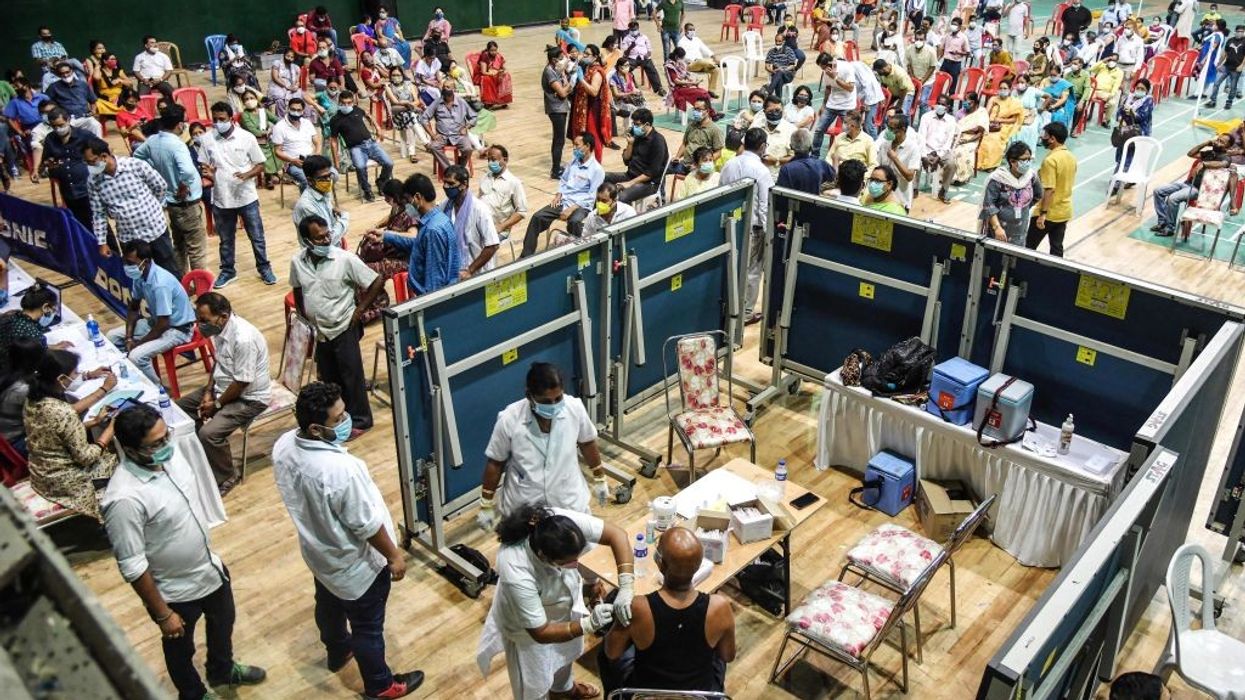INDIA recorded the world's highest daily tally of 314,835 new Covid-19 infections on Thursday (22) as a second wave of the pandemic raised new fears about the ability of crumbling health services to cope.
The health ministry data on Thursday is the most of any country since the pandemic began, taking total cases to 15.9 million, the world's second highest.
There were 2,074 fatalities, bringing the total death toll to almost 185,000.
The previous record one-day rise in cases was held by the US, which had 297,430 new cases on one day in January, though its tally has since fallen sharply.
The numbers are however considerably lower on a per capita basis than in many other countries, raising fears that the situation could get a lot worse.
Major private and government-run hospitals in New Delhi have sent out urgent appeals to the central government, calling for more oxygen supplies for hundreds of patients on ventilator support.
Some doctors were advising patients to stay at home, while a crematorium in the eastern city of Muzaffarpur said it was being overwhelmed with bodies and grieving families had to wait their turn.
In the western city of Ahmedabad, a man strapped to an oxygen cylinder lay in the back of a car outside a hospital as he waited for a bed, a Reuters picture showed.
On Wednesday (21), nearly 500 tonnes of oxygen was supplied to Delhi but this fell short of the required 700 tonnes per day.
The megacity's government, run by a different party to prime minister Narendra Modi's national administration, has accused neighbouring states governed by Modi's BJP of holding up supplies.
Late Wednesday the Delhi High Court ordered the government to ensure safe passage of oxygen supplies from factories to hospitals across India.
"You beg, borrow and steal but have to provide," the judges said, asking why the government is "not waking up to the gravity of the situation".
"In the last few days there has been a mad scramble for oxygen. One hospital or the other is running short," Delhi chief minister Arvind Kejriwal said Thursday.
"Now oxygen supply is coming... we are trying to ensure every truck carrying oxygen reaches the hospitals," he said, adding that he had requested oxygen be airlifted from the eastern state of Odisha.
Super spreader events
Recent months have seen mass gatherings in India, including millions attending the Kumbh Mela religious festival, political rallies, lavish weddings and cricket matches with spectators.
Now, states across India have imposed restrictions, with Delhi in a week-long lockdown, all non-essential shops shut in Maharashtra, and Uttar Pradesh set for a weekend shutdown.
Modi on Thursday (22) still urged voters in West Bengal however "to exercise their franchise" as parts of the eastern state voted.
This is despite West Bengal also reeling from the health crisis, with Kolkata "facing an acute shortage of hospital beds", said Kunar Sarkar, senior vice-chairman of Medica Superspeciality Hospital.
"Beds with oxygen supply are filling fast. Reports are pouring in that at least 100 people are waiting at every hospital in the city," said Sarkar.
Production of key coronavirus drugs slowed or was even halted in early 2021 at some factories and there were delays inviting bids for oxygen generation plants, according to press reports.
Distraught relatives are now being forced to pay exorbitant rates on the black market for medicines and oxygen, while WhatsApp groups are full of desperate pleas for help.
The US now advises against travel to India, even for those fully vaccinated, while Britain has put India on its "red list". Hong Kong and New Zealand have banned flights.
Australia on Thursday also tightened restrictions on arrivals from India, with prime minister Scott Morrison saying returnees from there now made up about 40 per cent of Covid cases detected in quarantine.
India's inoculation programme has hit supply hurdles, prompting New Delhi to put the brakes on exports of the AstraZeneca shot, which is manufactured locally by the Serum Institute.
India has administered more than 130 million shots so far and from May 1 all adults will be eligible for a jab.





